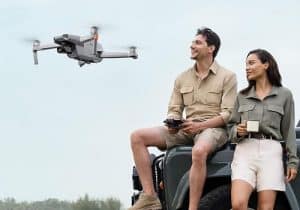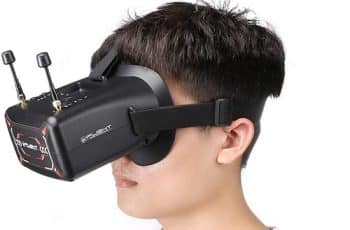Best drone for long range. Drones have completely changed several industries in today’s fast-paced world, including surveying and videography. However, what if you want a drone that really goes above and beyond? With so many choices available, selecting the best drone for long-range use might be difficult. This post delves deeply into the realm of long-range drones, showcasing the top models available and explaining what to look for. Keep an eye out!
Numerous long-range drones with incredible feature sets are available on the market nowadays. Selecting the best long-range drone for your needs might be difficult. This article highlights important facts about long-range drones and provides a breakdown of the best long-range drones presently available on the market.
Our Top Picks
- Best Overall: DJI Air 2S Fly More Combo
- Runner-up: DJI Phantom 4 Pro Plus V2.0
- Best Feature: Parrot PF728000 ANAFI Drone
- Best Rated: DJI Mavic Air 2 Fly More Combo
- Highest Quality: DJI Mini 2 SE
5 Best Drone for Long Range
1. DJI Air 2S Fly More Combo
One such kind of long-range drone is the DJI Air 2S. Amazing 7.5-mile range with continuous connectivity. Additionally, it has a 20MP camera with 5.4K recording and photo quality. The Air 2S has become the preferred long-range drone in the commercial sector, despite the military having its own fleet of long-range drones for certain purposes.
In addition to being fast, the Air 2S is also stable, trustworthy, and simple to fly. When folded into a tiny package, the Air 2S is convenient to carry in a bag for on-the-go usage. You may enjoy the path’s beauty from the comfort of your home because of its 7.5-mile range. Additionally, it can avoid harm from all directions because of its exceptional environmental sensing skills.
Specifications:
- Camera: 1-inch CMOS sensor, 20MP, 5.4K video
- Max Range: 7.5 miles (12 km)
- Flight Time: 31 minutes
- Obstacle Sensors: 4 directions
- Transmission: OcuSync 3.0
Pros:
- Exceptional video quality with 5.4K resolution
- Long transmission range with reliable connection
- Smart Controller with bright display for outdoor use
- Compact and travel-friendly
Cons:
- Pricey for casual users
- No side obstacle sensors
2. DJI Phantom 4 Pro Plus V2.0 – Drone Quadcopter
The Phantom 4 Pro plus V2.0 drone camera has a mechanical shutter to avoid rolling shutter distortion and a 1-inch 20MP CMOS sensor. The optional remote control comes with a 5.5-inch 1080p LCD screen that will keep your photos readable even in direct sunlight. When it comes to flying, the Phantom 4 Pro V2.0 is an amazing machine.
It can transmit up to 8 kilometers, attain speeds of up to 72 kilometers per hour, livestream in 1080p, and switch frequencies automatically thanks to OcuSync 2.0. Among the Intelligent Flight Modes that the Phantom 4 Pro V2.0 offers are TapFly, ActiveTrack, Draw mode, Gesture mode, and more. You may guide the fly to a certain height by sketching a route on the screen.
Specifications:
- Camera: 1-inch CMOS, 20MP, 4K/60fps video
- Max Range: 7 miles (11.3 km)
- Flight Time: 30 minutes
- Obstacle Avoidance: 5 directions
- Controller: Integrated 5.5” HD screen
Pros:
- Professional-grade camera and stability
- Highly accurate obstacle detection
- Excellent range and transmission reliability
- Built-in bright screen for visibility in sunlight
Cons:
-
Bulky and less portable than newer models
3. Parrot PF728000 ANAFI Drone
Anafi’s 21 MP / 4K camera captures stunning aerial video and stills. The 3-axis pivot stabilizes video recording. The powerful, rechargeable battery allows 25 minutes of flight. A longer range and better performance are possible with 60% more charging time for the pilot. FreeFlight 6 also streams HD video to your phone with reduced latency. Parrot Skycontroller 3 controllers are easy to mount and provide fine control even on long trips.
Geofences may keep Anafi out of dangerous areas. Find My Drone uses your phone’s map to find your drone if it goes missing. Anafi’s Smart Return to Home is another important safety feature. Anafi returns to launch if it loses Skycontroller communication. The drone is less likely to lose control and crash beyond repair.
Specifications:
- Camera: 4K HDR, 21MP, 180° vertical swivel
- Max Range: 2.5 miles (4 km)
- Flight Time: 25 minutes
- Transmission: Wi-Fi-based
- Weight: 320 g
Pros:
- Lightweight and foldable design
- Unique 180° camera tilt for creative shots
- Quiet operation with decent stabilization
- Affordable alternative to DJI drones
Cons:
-
Shorter range than competitors
4. DJI Mavic Air 2 Fly More Combo
The DJI Mavic Air 2 long-range drone is worth it. DJI’s Ocusync 2.0 transmission gives it 6.2 miles of range. Better still, it maintains a continual contact, making flying safer. One benefit of this drone is its lengthy battery life. The average flight lasts 34 minutes, allowing you plenty of time to snap photos and videos before landing the drone. Getting past obstructions is also important.
The obstacle-avoiding system has sensors in all four directions. APAS 3.0 automatically creates a safer path when barriers are present. Like many DJI products, the Mavic Air 2 folds for mobility. High-resolution video and stills are guaranteed by its 4k capability. Incredible, it can hit 42.5 mph (68.4 kph) in sport mode.
Specifications:
- Camera: 1/2″ CMOS, 48MP, 4K/60fps video
- Max Range: 6.2 miles (10 km)
- Flight Time: 34 minutes
- Obstacle Avoidance: Front, rear, bottom sensors
- Transmission: OcuSync 2.0
Pros:
- Long flight time and excellent range
- Sharp images and smooth video quality
- Compact and portable with intelligent flight modes
- Strong wind resistance and stable hovering
Cons:
-
No side obstacle detection
5. DJI Mini 2 SE
Its mobility and tiny size make the DJI Mini 2 SE stand out. Its lightweight and small design makes it excellent for travel. The drone can remain airborne for 31 minutes, providing you plenty of time to record footage without running out of battery despite its small size. Since the drone weighs under 250 grams, the FAA doesn’t need registration. The DJI Mini 2 SE’s 2.7K camera offers vivid photos and smooth video.
It has never failed me while recording stunning scenery and exhilarating sports events. It can transmit video over 6.2 miles, so you can fly it far away without losing quality. Another DJI Mini 2 SE feature is its usability. For beginners, DJI has made it one of the simplest drones to operate. It’s clever settings simplify cinematic photo and seamless video capture. I’ve even taken photowalks and other urban photo trips with it.
Specifications:
- Camera: 12MP, QHD video
- Max Range: 6.2 miles (10 km)
- Flight Time: 31 minutes
- Weight: Under 249 g
- Transmission: OcuSync 2.0
Pros:
- Lightweight and travel-friendly
- Impressive range for its size
- Beginner-friendly with auto return and GPS lock
- No FAA registration required (under 250 g)
Cons:
- No obstacle sensors
- Limited manual camera control options
BUYER’S GUIDE
Before any drone flight, make sure to familiarize yourself with your local laws and ordinances, as well as the local weather. Continue reading to learn the most important long-range drone flight advice.
Governing drones
Wherever you fly, always remember to verify local laws and drone restrictions. Flying is prohibited in some places, such as nature reserves. Always fly within your line of sight, and make sure your intended flight complies with any applicable local laws.
Climatic conditions
The transmission signal might be impacted by bad weather, which will make it difficult for you to manage your drone and lose signal. Always take to the skies in a clear, sunny day. Before and during your flight, we advise checking the weather forecast. For drone operators, several applications offer thorough weather analyses and forecasts.
Temperature
The discharge and performance of your drone batteries are impacted by temperature, which has an impact on how long and how far you can fly. Always fly with fully charged batteries and keep an eye on how long the drone’s battery will last.
Obstacles
Are there any areas in your anticipated flight path that require more care? If they get in the way of you and your drone, buildings, trees, and other things can interfere. Your transmission quality will be impacted by this interference, which might also result in signal dropouts. Fly over a wide area far from any massive things.
Observe flight
The most crucial drone flying advice is to always be on guard and keep an eye on the app’s display of flight data. Don’t let anything divert your focus from soaring. Your transmission and control of your drone may be substantially impacted by a sudden blast of wind or a swarm of birds.
FAQs:
Q. Is It Safe to Fly My Drone Off-Ground?
According to FAA regulations, drone pilots must keep a clear visual line of sight over their aircraft at all times. The FAA must offer a BVLOS (beyond visual line of sight) waiver for operators who want to fly their drones far away (and outside of their line of sight). These waivers are normally only given for authorized commercial drone operations.
Q. What Takes Place If My Drone Leaves Range?
Your drone will normally act in one of the following ways if it loses signal: it will either return to its base, hover in position, land at the next open landing spot, or it will just keep flying out into the distance. In the case of a signal outage or if their battery level drops below a predetermined level, the majority of consumer drones are built to autonomously return home.
Q. How Can I Extend the Range of My Drone?
The range of your drone may be extended in a few different ways. These can include both original equipment manufacturers’ and aftermarket improvements, suchas specialized remote controls, high-gain transmission antennas, range extenders, and other alterations that are outside the purview of this article. Flying from areas with little to no environmental interference (such as buildings, trees, power lines, phone towers, etc.) will help you improve the range of your drone in an easier and cost-free method.
Related:







